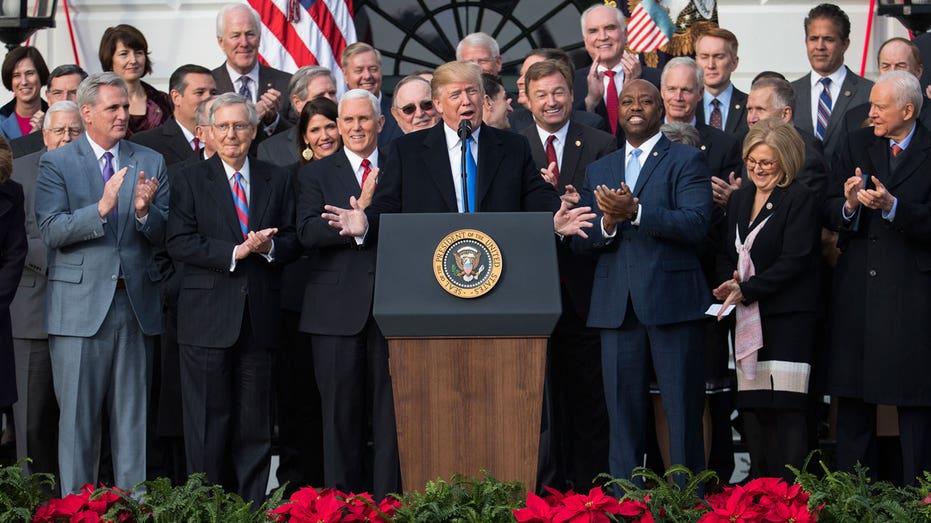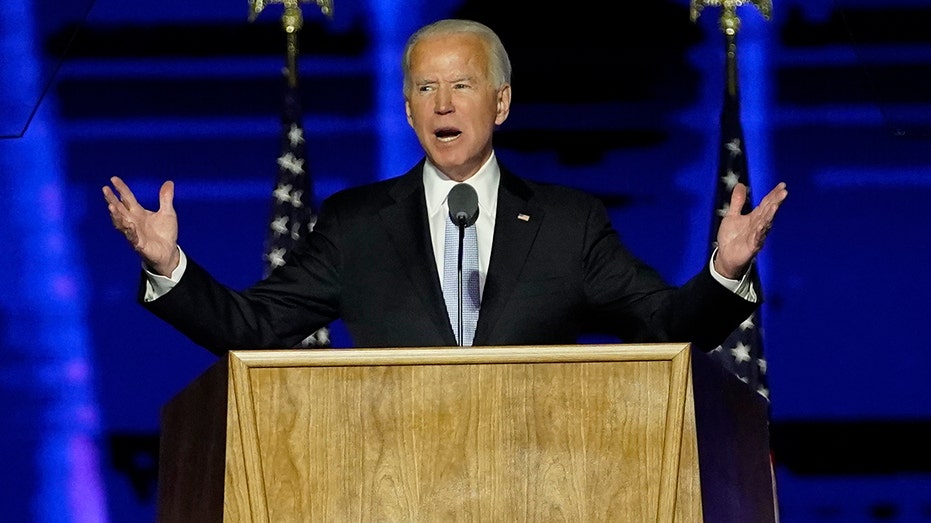Trump tax cuts poised to stay intact in Democrats' signature spending bill
Billionaire investor Mark Cuban: ‘I don’t have a problem paying more taxes’
Mark Cuban, the billionaire owner of the Dallas Mavericks in a wide-ranging interview on ‘Cavuto: Coast-to-Coast,’ explains markets, crypto investing, the potential for increased taxes and how the Biden administration is handling the U.S. economy.
President Biden campaigned on a promise to roll back the bulk of Republicans' 2017 tax law but appears unlikely to achieve that as part of his signature economic spending plan amid pushback from centrist lawmakers in his own party.
Biden assured voters ahead of the 2020 election that if he were elected, he would roll back the tax bill signed into law by former President Donald Trump on "day one" of his presidency.
President Donald Trump speaks during an event on the South Lawn of the White House in Washington, Wednesday, Dec. 20, 2017, to acknowledge the final passage of tax overhaul legislation by Congress. "I'm going to get rid of the bulk of Trump's $2 trillion tax cuts, and a lot of you may not like that, but I'm going to close loopholes like capital gains and stepped-up basis," Biden told donors in June 2020 during a virtual fundraiser. HOW WOULD THE NEW BILLIONAIRE TAX WORK? Instead, the majority of his predecessor's law seems like it would almost certainly stay intact as Democrats search for different ways to fund a roughly $1.5 trillion social spending plan. The Trump administration permanently slashed the corporate tax rate from 35% to 21%, temporarily reduced the top individual income tax bracket to 37% from 39.6% and substantially increased deductions with the passage of the 2017 Tax Cuts and Jobs Act. There were dozens of other changes to the tax code tucked into the measure, which reduced revenue by about $1.5 trillion over the course of a decade. As part of his "Build Back Better" agenda, Biden called for a slew of new taxes on corporations and the top sliver of U.S. households, including raising the corporate tax to 28%, nearly doubling the capital gains tax rate to 39.6% from 21%, restoring the top individual income tax rate to 39.6% from 37% and taxing capital gains at death. President-elect Joe Biden speaks, Saturday, Nov. 7, 2020, in Wilmington, Del. (AP Photo/Andrew Harnik, Pool) But the plan faced fierce pushback from Sen. Kyrsten Sinema, D-Ariz., who expressed opposition to the higher tax rates on corporations, individuals and capital gains, arguing it would do little to improve the nation's economic competitiveness or crack down on tax evaders. "She is committed to ensuring everyday families can get ahead and that we continue creating jobs," Sinema spokesman John LaBombard said in a statement on Friday. "She has told her colleagues and the president that simply raising tax rates will not in any way address the challenge of tax avoidance or improve economic competitiveness." GET FOX BUSINESS ON THE GO BY CLICKING HERE Instead, Democrats are pursuing a groundbreaking tax on billionaires and ultra-wealthy Americans, as well as a global minimum corporate tax. The measures floated this week by Senate Democrats would impose a 15% minimum tax rate on corporations based on profits they report to shareholders, a tax that would only apply to companies that reported over $1 billion in income for three straight years. Sen. Elizabeth Warren, D-Mass., speaks during a news conference on Capitol Hill in Washington, Monday, March 1, 2021, to unveil a proposed Ultra-Millionaire Tax Act. (AP Photo/Susan Walsh) (AP / AP Newsroom) The other plan would target the unrealized gains of billionaires, including stocks as well as other assets, like real estate, bonds and art, which can become vessels for the wealthy to legally store their fortunes and reduce their tax liabilities. (Many of the ultra-rich derive their vast wealth from the soaring value of assets like stock and property, which are not considered to be taxable income unless that individual sells). The proposal would only affect taxpayers with more than $1 billion in assets, or those with incomes of more than $100 million for three consecutive years, beginning with 2019, 2020 and 2021. Some critics have argued it paves the way for additional tax hikes down the road. Source: Read Full Article



